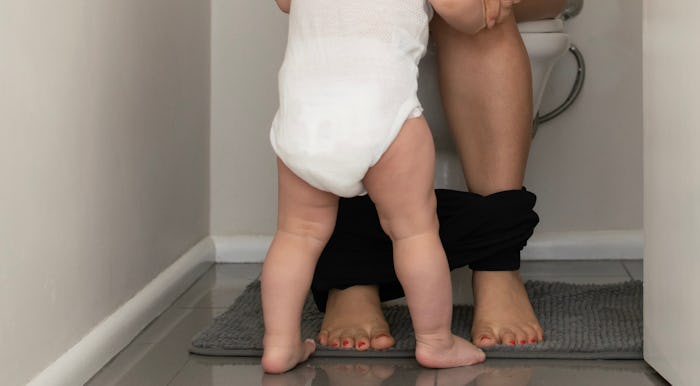Mental Health

Therapist Says: Alone Time For Moms Is A Necessity, Not An Indulgence
You seriously need a break.
"Self-care" is having a real cultural moment. But when you're a mom, trying to find the time to focus on yourself and only yourself can feel downright impossible. Unfortunately, a lack of alone time affects moms negatively, and in ways that can spell trouble in other areas of their lives.
Why Do Moms Need Alone Time?
“I consider [alone time] a necessity, not an indulgence,” Emma Bennett, a licensed therapist, tells Romper. She says that moms who do not get any alone time can experience parental burnout, feelings of resentment, being overwhelmed, isolation, anger, and a loss of sense of self.
Another reason that moms should take this seriously is because when you aren’t able to manage the mental, psychological, emotional load of motherhood, issues like perinatal mood and anxiety disorders (PMADs) can make matters even more complicated. “Lack of emotional or physical support can put moms at higher risk of developing a postpartum mood or anxiety disorder and lack of support/understanding can exacerbate these symptoms,” Erica Djossa, a psychotherapist, tells Romper. In fact, a lack of family and friend support is believed to increase the risk of developing perinatal mood and anxiety disorders, according to UNC School of Medicine's Center for Women's Mood Disorders.
A 2018 study of 2,000 parents conducted by Munchery, an online food delivery service, found that parents, on average, have only 32 minutes per day of "alone time," as reported by FOX News. And since moms are still shouldering the majority of child-rearing responsibilities, even though dads are more involved than ever before, according to the Pew Research Center, Djossa says that "alone time" for moms is less about being indulgent, and more about needing support.
“When moms are communicating they want time alone it usually means they want a break,” Djossa says. “I think that moms don’t get time alone when these connections and supports are lacking. They may feel both isolated and burnt out all at the same time. A remedy to this is ramping up supports and connections in order to have the ability to take a break.”
"They need help," she continues. "They are tired of being touched by tiny hands. They need a breather. But I think that this breather looks different for different moms.”
How Can Moms Find Alone Time?
For moms looking for some alone time, Bennett says they should simply try to do something that is just for them, like watching a show no one else likes watching, taking a bath, reading, or journaling. But Bennett also emphasizes the importance of brainstorming with your partner — or co-parent, if that is applicable — about how you can make it possible to carve out some blocks of time where you can focus on yourself.
“The goal isn’t to have rigid rules or expectations, but to be able to identify what your needs are on any given day and make sure they get met," Djossa says. "Maybe today you want alone time and watch a show on your laptop in your room. Maybe tomorrow you want connection and to dialogue with your partner about their day. Either way, prioritizing what you need is the key."
Dealing With Guilt Over Taking Alone Time
If moms are struggling to spend time alone because they are worried about leaving their child, Djossa and Bennett say doing the work of figuring out who you can trust to be a caregiver to your child can help. In addition to having open lines of communication and setting clear boundaries with those potential caregivers, Bennett says that moms should accept the fact that other people won’t care for their child in exactly the same way. And that's OK.
“Giving our children the opportunity to build other loving attachments to additional caregivers can be a good experience for children,” Bennett says. “It is OK to accept those feelings of nervousness and also try to work with them so you can have some separation." If you are worried about leaving your child with someone else, Bennett says you should gradually take time out for yourself in tolerable increments, to build up your confidence.
"It’s important to know that a fear or worry is just a thought, not a fact or premonition that something bad will happen," Djossa says. “Choose a trusted person to leave your child with and leave for five minutes at first. Gradually increase the amount of time as you get more comfortable. If your anxiety is debilitating, seeing a therapist to support you may be helpful.”
So, the next time you’re debating whether or not you should take some "me time," be kind to yourself and take some time for self care, whatever that means to you.
“Time alone isn’t just about being by yourself, it is about spending time away from caring for your family and their needs and doing something that nourishes you,” Djossa says. Whether that means grabbing a coffee and going for a walk around the block, listening to your favorite album on speakers while you take a shower, going for brunch with your friends, or reading Ancient Greek and gothic novels on your phone while your family sleeps, making time for yourself is a necessity.
You got this.
Experts:
Emma Bennett, a licensed therapist
Erica Djossa, a psychotherapist
If you or someone you know is experiencing depression or anxiety during pregnancy, or in the postpartum period, contact the Postpartum Health Alliance warmline at (888) 724-7240, or Postpartum Support International at (800) 944-4773. If you are thinking of harming yourself or your baby, get help right away by calling the National Suicide Prevention Lifeline at 1-800-273-8255, or dialing 911. For more resources, you can visit Postpartum Support International.
This article was originally published on